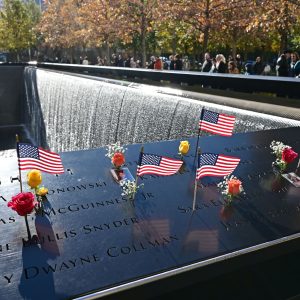 This week marks the 24th anniversary of the deadliest terror attack ever to happen on U.S. soil. As LAAPOA joins with the rest of our nation in remembering the events that shook the world on September 11, 2001, we mourn the thousands of lives tragically cut short and salute all the brave first responders who answered the call to action. 9/11 was a historic day, but for many, it is not past. Its effects continue to reverberate in the ongoing struggles of the survivors and in the enduring changes experienced by our aviation and law enforcement, reminding us that the full extent of its horror and heroism should never be forgotten.
This week marks the 24th anniversary of the deadliest terror attack ever to happen on U.S. soil. As LAAPOA joins with the rest of our nation in remembering the events that shook the world on September 11, 2001, we mourn the thousands of lives tragically cut short and salute all the brave first responders who answered the call to action. 9/11 was a historic day, but for many, it is not past. Its effects continue to reverberate in the ongoing struggles of the survivors and in the enduring changes experienced by our aviation and law enforcement, reminding us that the full extent of its horror and heroism should never be forgotten.
Nearly 3,000 people died and double that number were injured on the day of the 9/11 attacks, a series of four coordinated hijackings of commercial passenger airplanes departing from airports in the northeastern U.S. and bound for the West Coast. Two of the planes crashed into the North and South Towers of the World Trade Center in New York City. A third crashed into the Pentagon in Arlington, Virginia, and the fourth, heading toward the nation’s capital, was diverted into a rural Pennsylvania field after passengers heroically overtook the hijackers.
Compounding the devastation, 9/11 also became the deadliest-ever incident for our first responder family. As they rushed to save lives, 441 were killed that day, including 72 law enforcement officers from eight local, state and federal agencies. The Port Authority of New York and New Jersey Police Department alone lost 37 officers, the most of any police department on a single day in U.S. history. (For one PAPD officer’s firsthand account of that day and its aftermath, check out Episode 5 of LAAPOA’s video podcast, The Layover, in which President Marshall McClain interviews retired police officer Bobby Egbert.)
But unfortunately, the death toll did not end there. Those who participated in the nine-month rescue, recovery, investigation and cleanup efforts at Ground Zero in lower Manhattan came into contact with a host of contaminants in the smoke, dust and rubble that caused many of them to develop deadly illnesses. More than 400,000 total survivors, first responders, rescue and recovery workers, cleaning crews, local residents and others are estimated to have been exposed to these toxins, and tens of thousands nationwide are now suffering from chronic illnesses — including respiratory diseases, mental health issues and more than 100 different types of cancer. It is estimated that 9/11-related illnesses have claimed twice as many lives as the attacks themselves. When these diseases are factored in, the law enforcement community has suffered more than 600 line-of-duty deaths from more than 35 agencies as a result of that single fateful day. As we continue to lose more heroes each year, the victims and their families are still fighting to secure the full degree of financial compensation and medical support they need and deserve.
In addition to the deaths and physical and emotional injuries it caused, 9/11 had lasting effects on our profession — particularly for those of us charged with securing our nation’s airports. By highlighting previously disregarded vulnerabilities, the attacks forever altered the law enforcement and aviation security landscape with a renewed focus on counterterrorism, immensely expanding responsibilities for peace officers. The passage of the PATRIOT Act and the creation of the Department of Homeland Security and the Transportation Security Administration resulted in dramatic changes, especially to airport facilities and procedures such as baggage and passenger screening. While policies and procedures have evolved over the years (such as the TSA’s recent ending of the requirement that travelers remove their shoes during airport screenings), it is clear that most of these security measures are here to stay and it is necessary to remain on guard against future threats in whatever form they may take.
“Although it has now been nearly a quarter-century since 9/11, peace officers and especially airport police continue to live with daily reminders of the need for perpetual vigilance and ongoing investment in the security infrastructure and personnel necessary to protect our communities,” LAAPOA President Marshall McClain says. “The attacks were unimaginably destructive, yet there would have been thousands more casualties without the brave heroes who risked their lives to save others. As we reflect on this anniversary, let us give thanks for their valor, honor all those who never returned home that day or have been lost in the years since, remember those still battling the effects of illness and injury, and offer our continued support to the survivors. It is our solemn duty to ensure that they are never forgotten and do everything in our power to prevent such a tragedy from ever happening again.”
